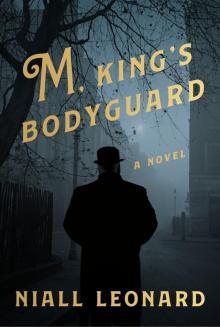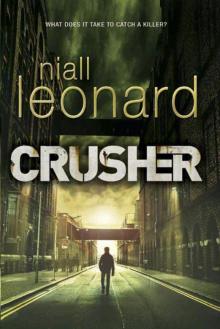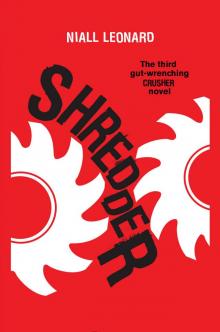- Home
- Niall Leonard
M, King's Bodyguard Page 2
M, King's Bodyguard Read online
Page 2
“I heard a rumour,” said Jakob suddenly. His tone of indifference rang so false I immediately raised my guard.
“What rumour would that be?”
“That your Queen is sick.”
I shrugged. “She has a cold, is all I heard.”
“Please pass on to her my very best wishes for a full recovery.” He smiled. That needled me; I knew the old lady, and I liked her, and I didn’t take kindly to his sarcasm. I responded with some of my own.
“Very touching. Coming from an anarchist.”
It was Jakob’s turn to shrug, and my turn to be surprised: I saw now he’d meant it. “I am a revolutionary socialist. And we are grateful to her, my friends and I. Like you say, we can breathe here. Meet, talk, exchange ideas. England is not Russia, where such things—or being related to someone who does such things—can get you jailed, tortured, shot, buried in lime. No trial, no appeal. Here we do not fear these things. The wise bird does not foul such a nest.”
Nice of you to say so, I thought. But if you and your friends ever did win power over here, you’d be shooting and burying men like me, and you’d be extra generous with the lime.
“Hm. If I’m up at the Palace anytime soon I’ll pass on the message,” I said.
I pushed my chair back and rose, glancing over my shoulder first to be sure I didn’t squash anyone seated behind me. I’ve always been big-boned and heavy, as deep as I’m wide, and in my fifties I wasn’t getting any lighter. As I shrugged on my overcoat and retrieved my bowler, Jakob rolled the sketches up.
“The next meeting is in March,” he said casually. “The eleventh.”
“Then let’s meet on the twelfth.”
“Here?”
“Not here, no. There’s a new ABC up the road in Hammersmith, top of King Street. Same time, all right?” I tipped my hat to him. No handshakes. “So long, now, Jakob. Take care.”
“I hope Mrs. Melville likes the sketches.” Jakob grinned, with his broken teeth.
“Oh, she will, I’m sure.”
* * *
—
The last squall had died away and the rain was easing off as I headed up Fulham Broadway. On the corner a piano-organ, cranked by an ancient grinder bent nearly in two, clattered into life with a tinny rendering of a Strauss polka. Urchins in threadbare jerseys crowded round, bare feet splashing in the puddles, to stare and laugh at the broken-tailed monkey that was clambering back and forth on top of the instrument. The wretched creature was fastened to the piano-organ’s lid with a thin chain, and it rattled a dented tin mug at the children and me. I fished in my pocket for a threepenny bit and tossed it to the monkey, who caught the coin deftly in the mug and bared its teeth in what I supposed was meant to be a smile of thanks. The old man cranking the handle tugged the brim of his cap as I passed.
So Jakob and his friends had been speculating about the Queen’s health? That unsettled me. The general public had no idea how poorly she was, but my own sources at her country residence, Osborne House, told me she was still in a wheelchair and had little appetite. She was nearly eighty-two now, and for a woman of her age there was no such thing as a simple cold; then again, she was a tough old bird who had seen off worse.
Farther up Fulham Broadway a street-sweeper was shovelling horse-dung into his barrow. I paused by his cart and pulled the rolled-up sketches from under my arm. The money would keep Jakob and his friends in bread and beer for a week or two, and maybe help to pay for a few seditious Russian pamphlets; more to the point, it would keep the Latvian on my hook for when I needed to reel him in. As it happened, I did like Jakob’s drawings, very much; but I’d lied to the lad. Mrs. Melville would hate them. I looked around to ensure no one was watching, twisted the sketches up into a tight wad and tossed them into the street-sweeper’s barrow.
Met at Walham Green with Jakob Piotr, sometimes known as Piotr the Painter. For the usual inducements he briefed me on the meeting the night before at the Anarchist Club in Soho, which was addressed by Rudolf Rocker (see separate file, R /M/00/00331). Confirmed Sgt Dawes’s report of a previously unknown attendant, possibly American. Piotr claimed not to know him either. Insp Quinn is cross-checking physical description with port records.
Notably Piotr did not mention the presence of Alexandrovich (see separate file, R /M/94) at the same meeting, though he and Piotr conversed at length. This suggests Alexandrovich’s current visit may indeed be connected to the planned shipment of weapons to Latvian rebels via Hartlepool.
Will assign Sgts Dawes and Willerton to covertly monitor Alexandrovich’s movements.
There was a sharp rap at the door, and I quickly covered up my notebook, though I knew from the knock it was Constable Jenkins. He’d been with Special Branch twenty years, but the fewer people I needed to trust the simpler my life was.
“Come in.”
“Sorry to interrupt, sir.” Jenkins, once a cavalry officer, still fought the urge to stand to attention and salute. “The AC has asked to see you, urgent.”
* * *
—
Assistant Commissioner Robert Anderson was my direct boss; ten years my senior, he was an Irishman like me, but there the resemblance ended. Short and wiry, he was a staunch Presbyterian, with a white beard that made him look like an Old Testament prophet, which was no doubt the intent. He had been a moderately famous barrister in Dublin when he was recruited by the British government to advise on the Fenian threat. I had joined the new Special Branch around the same time, and my colleagues and I quickly put paid to that particular Fenian threat, without any help from Anderson. But by then he had got his feet under the government table and found the life to his liking. With flattery and flummery he had inveigled his way onto various other official committees and boards, and over decades had slithered up the greasy pole to his present position. He had no direct experience of police work, whereas I had been a copper for nearly thirty years, most of it on the street. That fact seemed to irk him, judging by his constant need to assert his authority.
“William. Take a seat. I left word for you to attend immediately upon your return.”
“And so I have, sir.”
“Might I ask what business was so vital it took you away from your desk?”
“I was meeting a source. Routine, but necessary.”
“You’re head of Special Branch. It’s past time you learned to delegate.”
Our meetings seemed to be moulded on this pattern—a minor scolding, followed by instructions on how to do my job, concluding with orders to do what I was already doing. Talking to informers is one task that can’t easily be delegated, but Anderson didn’t know that, and he wouldn’t have accepted it if I’d told him.
“You’re right, of course,” I said.
“Hm.” He picked up a telegram from his desk, but did not show it to me. “Your presence is required at Osborne House, by His Royal Highness the Prince of Wales.”
Osborne House was Queen Victoria’s country retreat; I had often worked as bodyguard to the Queen and Prince Albert, but why was I needed at Osborne House? Unless young Jakob’s guess had been right, after all?
“Her Majesty?”
“Is gravely ill, according to her doctor.”
“That is sad news indeed, sir.”
“From his account, I fear the good Lord will gather Her Majesty to His bosom within the week.” Anderson, who had published thoughtful tracts on God’s Purpose for Mankind, was fond of such pious utterances. I was religious myself, but I tried not to let it interfere with my work; indeed, I suspected one reason Anderson invoked the Lord so often was to remind me of my place—a Catholic peasant promoted far above his station.
“It would appear,” Anderson went on, “that Dr. Reid saw fit to send a telegram directly to His Imperial Majesty Kaiser Wilhelm. The Kaiser has cancelled all his plans and is making his way direct to the Isle
of Wight. He is expected to arrive tomorrow afternoon.”
It was common knowledge that the German Kaiser worshipped his grandmother Victoria, who returned his affection with more warmth than she had ever shown her son Albert. It was also common knowledge that the Kaiser and his uncle Prince Albert despised each other. But not so much, surely, that Albert would need a bodyguard?
“I’ll finish my business here and catch the first train down in the morning,” I said.
“Be back as soon as you can. Arrangements must be made for the funeral.”
“Arrangements are in hand, sir. We have contingency plans. Detective Inspector Quinn has all the details.”
“This matter is not one I expect you to delegate, DCS Melville. It’s not merely the security arrangements—full consideration must be given to precedence and protocol.”
Precedence, of course. The Assistant Commissioner attached the utmost importance to the hierarchy of aristocrats and dignitaries, their ranks and titles and formal salutations.
“Anyway, the sooner you leave…”
The sooner you’ll be back, he almost said, before realising it was nonsense. To spare his blushes, I stood. “Sir.”
2
“Osborne House?” said Amelia.
“I’m catching the first train in the morning.”
We were seated at dinner, the children conversing in hushed tones about some American dancer called Isadora Duncan my elder boy William had seen perform at a friend’s house. Daring, William had called her, which I presumed meant indecent. Before I could ask exactly which friend it was whose parents laid on such exotic entertainment, Amelia seized on my remark.
“May the good Lord preserve her,” said Amelia.
“Who?” I said.
“Her Majesty. The paper said the Kaiser’s yacht was to call at Cowes. Is she really so unwell?”
“The message didn’t say.” I don’t know why I was being evasive; Amelia and I had been married ten years, and her powers of inference and deduction often excelled those of my colleagues.
“Have you packed a mourning band? Just in case.”
“Amelia, sure let’s not get ahead of ourselves.”
“I’ll see to it now.” She rose from the table and bustled off, while the children—hardly children, Kate, the eldest, was eighteen—chatted on, oblivious to the possibility that the world as they knew it might soon be ending. Which was, I reflected, how things should be.
* * *
—
On the 6:24 out of Waterloo I had a compartment all to myself, but although I’d brought a Gladstone bag full of papers, I found it impossible to focus on work. Instead I watched the lamplit soot-black suburbs of London give way to shadow, and before long could see nothing but my own reflection: a big bullock of an Irishman in a bowler hat staring pensively into the dark, squaring his shoulders against the enormity of the task ahead.
It was hard to imagine Britain, still less the British Empire, without Victoria. She ascended the throne long before I was born and had reigned for twenty-five years when I had abandoned Sneem, County Kerry, as a lad of fourteen. Rather than explain to my father and his clumping fists that I was fed up kneading dough and had no desire to become a baker like him, I took his horse and cart and left them hitched to a post outside Kenmare railway station. In London I ended up kneading dough again to make a living, but only for a few years before I joined the police force. Over the decades I had, through tenacity, low cunning and my own clumping fists, risen from beat constable to Detective Chief Superintendent Melville of Scotland Yard, champion of British justice—or notorious thug, depending on which papers you read—and bodyguard to emperors, foreign and domestic.
In the course of the latter job I had come to know Her Majesty the Queen and grown fond of her. She was tiny, and shrewd, and vigorous, and cared more for her servants than for the smug boobies of her Court. Prince Albert would find it a challenge to succeed her—but of course, that’s how monarchies work: Bertie would take the throne whether he was up to the challenge or not. Primogeniture might be an old-fashioned way of choosing a head of state, but it suited most civilised nations. The Americans, after all, had explored the alternatives and still occasionally lumbered themselves with venal idiots.
Anyway, Prince Albert’s qualifications, or lack of them, were not my problem; I had enough of my own. Victoria had decreed a full state funeral for herself and had been planning the details for a decade, fussing over colour schemes and flower arrangements. I had been making plans too, but not about the decor—they could drape her coffin in tinsel and feathers for all I cared. My job was to ensure the safety of the people and the realm. And if Jakob Piotr had guessed the Queen was on her deathbed, every anarchist on the Continent would be packing a suitcase by now.
Victoria was aunt, great-aunt or grandmother to more than half the kings and queens of Europe, and every relative that could attend her funeral would, along with ambassadors and ministers and satraps and liveried flunkeys from the farthest corners of every continent. The procession would stretch through London for a mile or more, and for terrorists it would be one long shooting gallery, with every prize a jackpot.
Terrorists. We Irishmen practically invented the concept, when Irish republicans had managed to get hold of Nobel’s great invention, dynamite. I understood well enough the Fenian passion for independence—if we Irish were to rule ourselves, we could hardly make a worse job of it than the English—but I had always been repelled by their means, especially when they involved lobbing dynamite at civilians. Violence against the innocent and the powerless infuriated me, and always had, even as a child facing my father’s fists and the schoolmaster’s tawse; that was why I had volunteered for Special Branch. The Republican Brotherhood’s campaign of terror soon collapsed, crippled by informers and turncoats—a good few of which I had helped to turn.
But by then the Fenians had inspired a new generation of radicals who sought nothing so simple as independence or self-rule. Their goal was to smash society and forge it anew, and to hell with democracy or the rule of law. They’d convinced themselves that if only enough emperors, kings and ministers could be slaughtered the common people would rise up and throw off their chains of bondage. And if one or two or a thousand of those common people died in the process, why, they would be honoured martyrs, sacrificed to a greater good. They would have died anyway, under the yoke of oppression! Rejoice!
Lord, how I despised these fanatics, who desecrated the very causes they claimed to support and allowed tyrants the world over to commit atrocities in the name of protecting the innocent.
No anarchist had ever struck in Britain, though London accommodated more than its share; perhaps because we did. In the last decade half the radicals in Europe seemed to have sought refuge in our capital. As Jakob had acknowledged, here there were no secret policemen or secret trials, and that was how the British people liked it. Dissidents and revolutionaries exiled from their home countries could meet and talk and publish and make speeches, and we let them, as long as that was all they did. It was not a policy that made us popular with our counterparts abroad, but we were not accountable to them, and it had worked out well for us so far. Russia, Germany and Spain all possessed fearsome secret police forces who cracked down brutally on dissent, but they had suffered all the same—King Humbert of Italy had merely been the latest victim.
In the last two decades Alexander II of Russia had been blown to pieces by an anarchist bomb, the Empress of Austria had been run through the heart with a stiletto as she boarded a ferry, and the Prime Minister of Spain shot to death relaxing at a spa. Only a few months back the Belgian anarchist Sipido had shot at our own Prince Albert and missed him by a hand’s breadth.
And it wasn’t just the nobility who suffered: twenty theatregoers in Barcelona had died in a welter of blood when two bombs were thrown into the stalls; a device in a cigar box had killed a d
ozen customers listening to an orchestra in a Parisian café. All in the name of equality and justice and freedom.
These provocations, these atrocities, were specifically intended to terrify the public, to bring down governments, to spark revolution, but they risked far worse. Europe’s empires had massive standing armies full of dashing young bucks hungry to prove their valour in war and ravenous for a pretext to start one—the murder of a prince or a king might well drown the continent in blood.
I stared through my reflection into the endless murk of night. I had a team of experienced officers that I had personally trained, and a network of carefully cultivated civilian informants, but nobody can see into the hearts of men, and none of them could tell me when one of our exiled radicals might tire of talking and decide to act. If I summoned every policeman in the Empire to form a cordon along Victoria’s funeral route, it would not be enough to stop a single determined assassin. One lucky bullet, one stick of explosive…
Somehow, over the clatter of the train’s wheels, I heard a sudden burst of birdsong and noticed away in the east the first pale rays of dawn seeping into the clouds. Enough of this brooding, I scolded myself. I had a job to do, and little enough time to do it. I opened my briefcase and pulled out my papers.
* * *
—
From the window of my carriage I watched the Italianate towers of Osborne House loom up. Evergreen myrtles and cedars lined the western drive, throwing long shadows across the lawn where even now, in the late morning, the grass glittered with hoarfrost. My brougham rocked to a halt outside the Durbar Wing, and as I stepped down I was greeted by the familiar face of Ross, head of staff to the Prince of Wales. I tipped my hat in return to his short solemn bow. Osborne House had never been what you’d call an informal environment, but today it was more solemn than ever. A grim hush hung about the place; everyone there knew an era was ending.

 M, King's Bodyguard
M, King's Bodyguard Crusher
Crusher Shredder
Shredder Incinerator
Incinerator